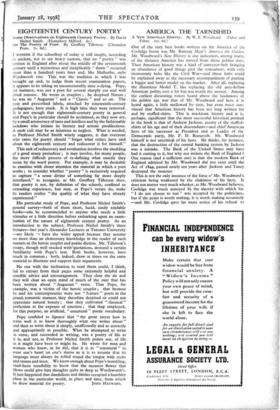EIGHTEENTH CENTURY POETRY
Some Observations on Eighteenth Century Poetry. By David Nichol Smith. (Humphrey Milford. 6s.)
On The Poetry of Pope. By Geoffrey Tillotson. (Clarendon Press. 7S. 6d.) I WONDER if the schoolboy of today is still taught, according to ancient, not to say hoary custom, that no " poetry " was written in England after about the middle of the seventeenth century until a mysterious and inexplicable " dawn " occurred more than a hundred years later and, like Malherbe, enfin Wordsworth vint. This was the tradition in which I was
brought up and, to judge from recent examination papers, it appears to be taking an unconscionable time a-dying. Pope, for instance, was not a poet for several sharply cut and well dried reasons. He wrote in couplets ; he despised Nature ; he was an " Augustan " and a " Classic " and so on. The neat and prescribed labels, attached by nineteenth-century
pedagogues, have stuck. It is high time they were removed. It is not enough that eighteenth-century poetry in general and Pope's in particular should be acclaimed, as they now are, by a small aristocracy of taste and intellect and by the fashionable jackdaws who imitate its literary and artistic predilections. A snob cult may be as injurious as neglect. What is needed, as Professor Nichol Smith wisely suggests, is that everyone who cares for poetry should " forget what critics have said about the eighteenth century and rediscover it for himself."
This task of rediscovery and revaluation involves the shedding of a good many prejudices ; it may involve, for many people, the more difficult process of re-defining what exactly they mean by the word poetry. For example, it may be desirable to examine with closer attention the material in which a poet works ; to consider whether " poetry " is exclusively required to capture " a sense divine of something far more deeply interfused," to recognise, as Mr. Geoffrey Tillotson does, that poetry is not, by definition of the schools, confined to extending experience, but may, as Pope's verses do, make its readers realise " the quality of what they have already experienced."
His particular study of Pope, and Professor Nichol Smith's general survey—both of them short, lucid, easily readable books—can be recommended to anyone who needs a little stimulus or a little direction before embarking upon an exam- ination of the nature of eighteenth century poetry. As an introduction to the subject, Professor Nichol Smith's three lectures—last year's Alexander Lectures at Toronto University —are likely 4-) have the wider appeal because they assume no more than an elementary knowledge in the reader of such matters as the heroic couplet and poetic diction. Mr. Tillotson's essays, though well stocked with quotations, demand a certain familiarity with Pope's text. Both books, however, have much in common ; both, indeed, draw at times on the same material to illustrate and support their arguments.
No one with the inclination to read them could, I think,
fail to extract from their pages some extremely helpful and sensible advice and encouragement. They clear the air and they will clear an open mind of much of the cant that has been written about " Augustan " verse. That Pope, for example, was a victim of the heroic couplet ; that because he and his contemporaries were not " Nature " poets in the grand, romantic manner, they therefore despised or could not appreciate natural beauty ; that they cultivated " classical " perfection at the expense of emotion ; that they employed, for this purpose, an artificial, " unnatural " poetic vocubulary.
Pope confided to Spence that " the great secret how to write well is to know thoroughly what one writes about " and then to write about it simply, unaffectedly and as correctly and appropriately as possible. What he attempted to write in verse, and succeeded in writing, was a poetry of life as it is, and not, as Professor Nichol Smith points out, of life as it might have been or might be. He wrote for men and women who knew, as he did, that it is as " unnatural " to wear one's heart on one's sleeve as it is to assume that its language must always be rolled round the tongue with rocks
and stones and trees. We know enough about Pope's trembling, snail-horn sensibility to know that the meanest flower that blows could give him thoughts quite as deep as Wordsworth's. It just happened that dandelions and daisies occupied a humbler place in the particular world, in place and time, from which


















































 Previous page
Previous page